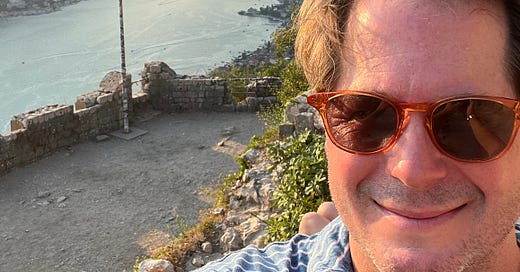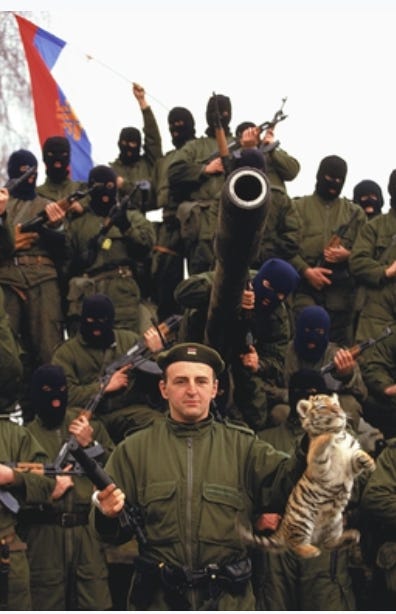A friend invited me to join him for a few days at his place on the coast near the ancient walled city of Kotor, Montenegro. Yesterday I hiked up to St. John’s Fortress, which, for centuries, served as a place of refuge for the people of Kotor whenever they were attacked by foreigners. Strategically located in a perfectly protected natural bay on the Adriatic coast, Kotor has been been coveted by just about every warlord in European history—Greeks, Macedonians, Romans, Turks, Saracens, Venetians, Austrians, Germans—you name the people, they’ve probably taken a crack at seizing Kotor.
Over dinner at a local restaurant I engaged the owner—a young man who’d been born and raised in the old town and who spoke astonishingly good English. So thrilled was he to hear I am from Texas that he immediately changed the soundtrack on the patio to Stevie Ray Vaughn’s greatest hits.
“I tried for years to learn how to play ‘Texas Flood’ on my guitar, but I just couldn’t do it,” he explained. He was a proud member of the the Boka Navy—the world's oldest continuously operating seafaring organization, founded in 809 A.D.
Fairly late in the evening, after most of his customers had paid their bills, he sat down with me and did his best to explain the Yugoslav Wars—a series of separate but related ethnic conflicts, wars of independence, and insurgencies that took place from 1991 to 2001.
“Tito was a very charismatic leader,” he explained. “After he died, everyone lost their belief in Yugoslavia as a unified nation, and we reverted back to our ancestral, tribal identities,” he explained. “The Serbians wanted to keep the whole thing intact, and we Montenegrins stuck with the Serbs, but everyone else wanted out.”
Among the many spectacularly bizarre things he described were Serbian paramilitary units such as Arkan’s Tigers—an armed band under the leadership of a notorious gangster named Željko Ražnatović, AKA “Arkan.”
“Why were guys like Arkan’s Tigers so ferocious?” I asked my host.
“They were self-serving gangsters, but they also really believed in their ethnic and religious superiority,” he replied. “We often talk about the Nazis as the true believers in ethnic superiority, but Nazi ideology may be adopted by any people who define themselves by their ethnicity.”
Especially strange to me was the conflict between Croats and Serbs. Over the years I’ve been fairly close friends with guys from Croatia and from Serbia, and I’m pretty hard pressed to see what exactly distinguishes them from each other. After the Great Schism, the Croats remained Roman Catholic while the Serbs became Greek Orthodox, but none of my friends professed to be religious.
The Yugoslav Wars serve as a cautionary tale of the horrors that can occur when the belief in E Pluribus Unum dissolves. In the vacuum of belief, an atavistic fetish for group identity may arise—that is, defining oneself by one’s ethnicity, race, gender, or political party.
P.S.—Trivia question: What famous fictional character in American literature claims to have received a military decoration from Montenegro? The first person who answers in the comments (without Googling it) wins a transferable paid gift subscription.







When only a tiny fraction of your citizenry makes an effort to understand some world and national history, the sludge of ignorance gets pretty deep. No one is expected to become Victor Davis Hanson, just take a whack at understanding the improbability of the American Experiment. The founding fathers built in safeguards against the danger of factions. Ahistorical fools are trying to dismantle those safeguards.
Thanks for sharing about the beauty of Kotor.
I'm still not clear about exactly what happened in the Balkans, but I am clear that Clinton, Blair and NATO have gallons of blood on their greedy hands.